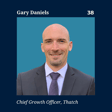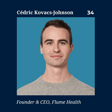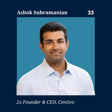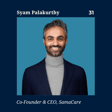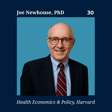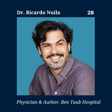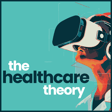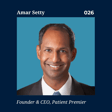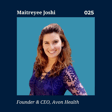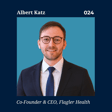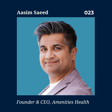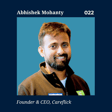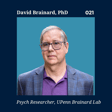Become a Creator today!Start creating today - Share your story with the world!
Start for free
00:00:00
00:00:01

Reducing Hallucinations and AI Bias | Estenda Solutions CEO RJ Kedizora
We’re joined by RJ Kedziora, co-founder of Estenda Solutions, to discuss his role in offering custom software solutions that innovate healthcare delivery.
Estenda Solutions is transforming healthcare software development by addressing challenges like data fragmentation, biases, and interoperability. RJ shares his journey from aspiring AI researcher to healthcare-focused entrepreneur, highlighting how Estenda’s commitment to empathy and altruism drives impactful solutions. Learn how they tackle complex problems like diabetic retinopathy detection, AI-driven insights, and patient-centric designs while navigating the evolving landscape of healthcare technology.
Transcript
Podcast Introduction
00:00:00
Speaker
Welcome to the Healthcare Theory podcast. I'm your host Nikhil Reddy and every week we interview the entrepreneurs and thought leaders behind the future of healthcare care to see what's gone wrong with our system and how we can fix it.
Introducing RJ and Astenda Solutions
00:00:14
Speaker
Today we're speaking with RJ of Astenda Solutions. Astenda is a digital health company providing custom software solutions to healthcare companies. So hi RJ, welcome to the Healthcare Theory and thanks for coming on today.
00:00:26
Speaker
Good day, and how are you doing? i'm I'm looking forward to our conversation. I'm doing good. um Pretty good day so far in Boston, so I'm pretty excited, too.
RJ's Background and Transition to Healthcare
00:00:35
Speaker
And before we even get into, like, extended solutions, I wanted to discuss, like, your background. I mean, why did you get into healthcare, care and what was the focus on technology when you first started? Absolutely. I got into software development before I even got into healthcare. I, you know, grew up in the 70s and 80s, went to college in in the early 90s with interestingly the idea that I was going to get a computer science degree and then go on to get a PhD in artificial intelligence. It's one of those things that people forget that AI has been around for a while. It just didn't you know hit the scene in the last couple of years.
00:01:13
Speaker
And what happened through those college years is I got a job and then a job offer and it was like, okay, do I take on more debt or do I go out in the world and work? So I went out in the world and and started working, but that passion and drive to use artificial intelligence over the years has always been there. And I've been part of numerous projects over the decades in various different iterations of creating expert systems as part of that.
00:01:40
Speaker
and worked my way through in the 90s through different industries. Worked for mortgage industry, pharmaceutical industry, and it was that pharmaceutical industry experience that really got me thinking of how do I make the biggest impact. I was very fascinated by the idea of healthcare and medicine and what technology could do. Healthcare loves technology.
00:02:07
Speaker
has adopted significant technology, but much more in and in terms of the hardware and images, image acquisition and understanding what's going on inside the body. You see the x-rays and the MRIs and drug development, but hasn't really until recently embraced the idea of data.
Astenda's Evolution in Digital Health
00:02:25
Speaker
And that was the idea of Astenda when we got started back in 2003. So we've been been doing this for a few decades, which is crazy for me to to think about. And when I can talk about decades, it's no more years. But back then it was, okay, we have this limited amount of information. Most healthcare care practitioners were still on paper.
00:02:47
Speaker
um and and had large rooms full of of paper charts kind of thing. and Getting that information was very difficult. Understanding what was going on in the body between those offices was very difficult. you know We're often just asking patients questions about their experience.
Data Utilization in Healthcare
00:03:05
Speaker
Fast forward two decades now, healthcare care practitioners are overwhelmed with the amount of data that they have to deal with.
00:03:12
Speaker
So the conversations change change from how do we get that data to now? How do we make use of ah that data? And why healthcare? it's it's some It's a nice sense of satisfaction of going to sleep at night, knowing that the things we've helped other companies create are making a difference in the world.
00:03:34
Speaker
know I admire the doctors, the healthcare care practitioners out there doing their thing, but they're an N of 1, that they can make only so much impact. And then you look at a particular company, they can make a much larger impact. And then as we work with multiple companies on multiple products over the years, we can make an even bigger impact. So I've really enjoyed that and be able to to make a difference in the world.
00:04:00
Speaker
Yeah, of course. Because I mean, technology and AI can be applied anywhere, for industrial, for example, industrials, I'm sure you can like improved manufacturing by five bottles per hour. But you get us picked healthcare, right, which is more difficult. And like you identified and spoke on earlier, technology is a big growth lever to like allow doctors that are already trained to see more people. But you you kind of mentioned that like when you first started out, like software wasn't being applied or picked up as
Challenges in EMR Adoption
00:04:28
Speaker
quickly as the hardware. and I mean, why do you think that was and what was kind of going on back then that slowed adoption?
00:04:34
Speaker
I think the the biggest challenge in in the early 2000s was just the idea of paper records and the move to EMRs, which was here in the US with government mandated in 2009 with I think it was the high tech act. that you know There was not a lot of drivers in the industry to move to those electronic medical record systems.
00:04:57
Speaker
Still, yeah they're they're not really well-designed, unfortunately, for healthcare care practitioners. They are getting better over the years. um But predominantly, they were designed for capturing data for billing purposes, not for really driving increased productivity, um driving patient care. That has sort of come on the backside of this, that now that we have this data,
00:05:22
Speaker
um you know How can we actually make use of it? But you know the idea of data silos today and interoperability is still very much a challenge in the healthcare care industry. Again, over those two decades, it has gotten easier. you know Years ago, when we started, we worked with military healthcare.
00:05:39
Speaker
here in the u.s and the veterans association and they did have electronic medical records so that was fascinating and even in the early days of the mrs when we would help companies you know integrate their data into the mr wanna pull information out very often.
00:05:56
Speaker
you know The database vendor, the EMR vendor would just be like, here's our data. Good luck. ah That was very challenging trying to you know find the information and how to make use of it. Whereas now there are API-based standards to make it easier to access that data.
00:06:16
Speaker
in In where the APIs, they're called Fire, F-H-I-R, APIs, I think the key is that they haven't completely solved the problem, but so many more people know how to use APIs. Software developers, as they come out of university these days, understand how to use APIs so they can make use of those to use the data to create new solutions and and get access to that information. Some of those technology challenges of how do you share that information have been worked out.
00:06:46
Speaker
Now it's just about the the quality of the data that's available. And that makes a lot of sense. I guess like you need more infrastructure as you get more data. And one thing I'm kind of curious about is that oh when you first joined Astenda, as opposed to now, like what was your and initial... I mean, you're a services company, right? You're selling to clients and you're advertising yourself and your team. and What was your original pitch and story to like gain clients? and And can you really explain like what Astenda has become today and how it's shifted since then?
Astenda's Project Focus Shift
00:07:14
Speaker
Absolutely. I am one of the co-founders of Good Friend Drew Lewis. we We started the organization. When we started and back in 2003, Astenda in the name of the company is Portuguese for extend. So our original idea was how do we extend the enterprise? How do we you know help empower these systems to be able to do more with data and software?
00:07:40
Speaker
In the first 10 years of our world was really grant-based software development. So as we would partner with different institutions, um healthcare care systems, small startups, larger organizations in those early years, we would work together to go and get a grant from the National Institutes of Health, for instance. um They have extensive grant programs.
00:08:08
Speaker
or Robert Wood Johnson, we got some grants from them over the years. Military healthcare care has an extensive grant program to you know advance the science of what's possible with technology. So that drove the first 10 years. it It was like, as as we wanted to develop a new system around diabetes or hypertension, ah educational program, it was like, how are we going to fund these solutions? and And the answer very often was like, let's go get a grant together.
00:08:38
Speaker
So it's it's driven our ideas very much on the innovation side of things. So when we engage with customers even today, it's very much very early in the stage where they're just trying to figure out you know what they need to create. And in some cases, not even familiar with what it means to develop solutions in in healthcare, care you know what are the do unique challenges in in healthcare development versus other industries.
00:09:05
Speaker
And the the more recent 10-year history of Ostenda, how it's shifted over the years, is more of a balance between commercial work, um but still very much that have a grant-based focus. We have a couple of PhDs on staff to help you know write those grants, run the clinical trials, do the data analysis, and and create the peer-reviewed journals.
00:09:30
Speaker
which has been a fascinating journey journey because even as we work with Fortune 50 companies, predominantly medical device organizations, their R and&D group or a product development group.
00:09:43
Speaker
And startups is is just that. It's like, let's develop new ways of looking at data, finding patterns, but then also making recommendations.
AI's Role in Healthcare Data Interpretation
00:09:54
Speaker
So these days, particularly as I talk to startups, it's like, I have all this data. Let's find patterns and and show the the doctor these patterns, or even show the individual user, the patient, those patterns. Well, the you have to ask yourself what happens next.
00:10:11
Speaker
you know if If you are showing new data to a provider, what are they going to do with it? know You're lucky if you know you go to your doctor and they have seven to 10 minutes kind of thing. If you show them data you know on your phone, they're not going to be trained to see and understand this data, the presentation format. They're not going to be familiar with it. So you really need to go the next step of, OK, how do you provide advice and recommendations to the next stage? And from a startup perspective,
00:10:41
Speaker
You really have to be aware of the FDA. And so you know if you are um making claims about you know improving health conditions, then the FDA is going to you know come knocking at your door. um So you know talk to them. They're there to help you and facilitate things. They're they're your friend, not your enemy.
00:11:01
Speaker
um But we see that even in these Fortune 50 organizations. It's like, okay, it's one thing for us or a doctor or a PhD to say, hey, this is a really good idea. I think this will help improve patient health. But then you have to run the clinical trials and and make sure that it actually works. Yeah. That makes a lot of sense. It's it's kind of a difficult problem, but and it's hard to solve. I mean, one thing I'm kind of curious about is that, I mean, you guys have, of course, identified already as AI.
00:11:32
Speaker
As companies, again, machinery gets better. For example, we used to talk to somebody who's doing mass spectrometry. And like these machines now, and not just mass spec, but so many others, provide more and more data. And of course, as data loads go up, your need for, I guess, your ability to understand it as a human goes down because there's just so much going on. So how's AI been helpful so far? And what has that like discussion been like with you guys with figuring out like where can AI be used and how can it be implemented in your in your workflow?
00:12:02
Speaker
there's There's two worlds of AI. um One, I've called it the forgotten AI. It's really the machine learning aspects of it, which is what's been around for a long time. um very I think the FDA has now approved close to 1,000 systems, algorithms that are AI driven. Predominantly, I think it's maybe even 800, 850, are in the world of imaging.
00:12:29
Speaker
is where the AI technology from the machine learning perspective has really made you know the big difference. You can train the systems to look at an image um and and make a diagnosis and find you know various different aspects of that. um you need We've done a lot of work in diabetic retinopathy, which is the leading cause of preventable blindness.
00:12:52
Speaker
And so we've helped train some algorithms to identify diabetic retinopathy in you know retinal images. So it's been fascinating work. And that's just one example of the things we've done and and how we're very much on the innovative side, because even that paper that got published related to that research and um they're one of the software developers, you know because they were so much part of their research, had their name on it. I don't think they quite realized the value of that because they're a software developer as opposed to you know a PhD candidate or a physician. But yeah, they were so much part of that solution and and creating the machine learning, um doing the training that that his name was included. So that was good to see.
00:13:37
Speaker
And then you get to Gen AI, which is really the what everybody is talking about these t date to these last two years. it's It's barely two years old, but it's made a significant difference. And as more and more data is you know put out into the world, we as humans are just going to have an increasingly more difficult time understanding that data, finding the patterns and understanding what to do with that information.
00:14:06
Speaker
And that's where that you know machine learning and the AI comes into play to make a difference. I wear an oral ring, which tells me all sorts of information about my sleep. um you I work, you know do a lot of work with continuous glucose monitors for patients with diabetes. These devices generate data as as frequently as once a minute. So you're generating a large amount of information to then have to be able to understand what to do with it.
00:14:36
Speaker
um Interestingly, a lot of those companies have created continuous glucose meters for people without diabetes now. So I'm fortunate that I don't have diabetes, but I know the science and understand the science. And I wore one of these devices for two weeks to, you know, okay, what does my glucose look like in my body as a ah normal person?
00:14:59
Speaker
And how does what I eat you know impact the glucose? And so I know if I eat a meal and then go for a walk afterwards, my blood glucose levels so aren't going to spike as high. But to see that in the numbers and see that in the graph that they present in their app is very powerful to do that. Even the order in which you eat your food, if you eat and the proteins first versus your carbohydrates, you're going to see a difference in in that trajectory, which is really nice to see.
00:15:29
Speaker
Um, but there's just so much, I bought a headband recently, um, that monitors your brainwaves. You know, I feel like I should just sit here and like wear it all day long to see what actually happens. I haven't quite gotten that far yet, but it raises the interesting question of what do I do with that data? So, you know, my ring and there's probably five or six different rings on the market that monitor your sleep now.
00:15:52
Speaker
Okay, there's some generic information. It's like, don't eat right before you go to bed. You know, don't watch TV, put your phone down, you know, relax and rest before you fall asleep so you have a better night's so of rest. But then don't drink alcohol. You know, what do I do after that? You know, it's like, okay, I didn't get a lot of deep sleep last night. You know, how do I adjust?
00:16:15
Speaker
it's It's that N of 1 where the AI is really going to make a difference. There's this generic idea of how you improve your sleep, how you improve your your physical fitness, your overall health. But then it's like N of 1. And that's where the AI is is really going to come in.
00:16:31
Speaker
from interpreting and making recommendations, but then also explaining that to individuals. So I, as a person that's been working in healthcare and data for 20 years, has a different appreciation and understanding of data than someone that's newly diagnosed with diabetes or anything, where they have to learn so much. So AI can explain it, and then you as an individual can be like, I don't quite get that. Can you explain it to me in a more simple fashion?
00:17:00
Speaker
And it can turn and do that very quickly. And if you still don't understand it, it can make it even more simple kind of thing. Just if you use, you know, Gen AI and the ones out there, ask it to explain quantum physics to you as as a kindergarten kid. Yeah. And it's going to do that for you if you understand that, which is fascinating.
00:17:19
Speaker
Yeah, no, it's really interesting because I mean, I guess when you get a recommendation from anything, no one's going to listen or no no one listens to anything, invest in anything or listens to recommendation if they don't understand it in the first place. And generative AI is such like a big, i it's already had that impact. But from here on out and kind of like in the past couple of years and even the next couple of years, what type of technology, what specific like sector of technology hasn't had the most impact in AI?
Generative AI's Impact on Healthcare
00:17:45
Speaker
and the past couple years obviously the gen i has has had the the biggest impact and you know it still hasn't really been implemented in the world let alone in healthcare um you know i am very Hopeful i'm in and think the jenny i has huge potential but particularly in healthcare you do have to take a cautious approach and be aware of the risks that are involved you know it's it does have a tendency to hallucinate and make things out i'm so there should always be a human is part of that component
00:18:21
Speaker
But it raises an interesting question. you know I saw a research report that look at looked it at Epic, which is probably the biggest EMR you know provider out there. They had um are deploying all sorts of AI systems within the EMR to increase productivity and and make everyone's lives easier. One of which is it can generate patient communications.
00:18:46
Speaker
And a researcher looked at this at like one institution and I think it was like 113 messages they looked at. And in those messages, they found seven mistakes or hallucinations. And they didn't go into the details of what those hallucinations were, which would have been really interesting to see and understand. But I find fascinating in a lot of these articles and research studies that look at the problems and challenges of generative AI,
00:19:14
Speaker
don't compare they they don't compare it to humans. Humans make mistakes too. So out of 120 messages that humans sends, how many mistakes were made as part of that? It's like, okay, maybe there was 10.
00:19:30
Speaker
you know it is Yes, it is pure supposition on my side, but humans are fallible. We get tired. um And you know when you look at that patient communication, patients time and time again in research studies are so are saying the generated message is more empathetic. They like it better than what their provider is is responding to. So you can increase your game when you think about patient satisfaction as as a hospital or health system.
00:19:59
Speaker
there's a huge opportunity to be able to use that that technology. Yeah. That makes sense. Cause if you're a doctor and you're really just seen 10 patients with no time in between, maybe you won't be sending those exclamation marks or as energetic like your generative eye usually would be.
00:20:14
Speaker
But i mean with these solutions, there's a clear demand. And of course, the data and also the infrastructure is there to build AI solutions. But have there been any challenges when developing these solutions, getting them out there, and making them and tailoring them to each company you work with? What's that been like for you guys?
00:20:32
Speaker
There are definitely challenges. One, if you look at its startup you know the startup world kind of thing, I think a lot of startups have to work on truly differentiating themselves.
Challenges for Startups in AI
00:20:43
Speaker
I went to the HIMSS conference earlier in the year. HIMSS is the largest healthcare IT conference out there. They have something like 20,000 or 30,000 people, 1,000 vendors. It's just overwhelming.
00:20:59
Speaker
But, you know, you're walking down one of the aisles of vendors and there's like four vendors that all do, you know, patient chart summaries. And I'm like, okay, what's the difference? What do you do different than, you know, the other two people that are standing next to you? And, you know, unfortunately at that moment in time, nobody really had an answer. They were just trying to, you know, get their name out there. So yet you really do have to work on how you're differentiating yourself. How's that technology?
00:21:24
Speaker
you know improving the world and and making a difference. How is it going to improve patient health? How is it going to increase efficiency um of the provider to to make a difference to and make an impact in in the world and why is the health system going going to adopt it?
00:21:43
Speaker
When you look at even you know training the machine learning systems or or using AI, you do absolutely have to be aware of bias in the data. And and this is the big challenge in the world because humans are biased.
00:21:58
Speaker
And, you know, we are getting better at this, but, you know, women weren't really included in healthcare care research until like the nineties. There was a recent report that even looked at um women, the representation of women in cardiac studies, and they're still underrepresented today.
00:22:17
Speaker
So, you know, we have to continue to strive and and do better better at that. um Even, you know, the the various technologies like the Apple watches and the Aurorings and, you know, I don't want to single out those specifically, but they use a technology that's looking through the skin.
00:22:36
Speaker
It's been demonstrated that if you have darker colored skin, they don't work as well. Yeah, sensors, right? Yeah. Still not you know a challenge the industry has solved. it It is getting better. We recognize it now, so the industry is working on it. But it is still absolutely a challenge out there. So yeah, as as we you know work with startups and are working with various organizations, it's making sure that we address those biases in the data and have good representative data um and understand what we're working with um is is a challenge. But you also have to worry about drift, which is the idea as the data change. So you know you develop an algorithm, you put in a production, and as the data changes over time, your algorithm might not work as well anymore. um you know New codes might come out, you know changing how you do that data. New training mechanisms might come out, how you how you work with the data.
00:23:35
Speaker
We saw this in our machine learning learning work with retinal images. um Early camera systems only had a very small field of view. um Newer cameras have a much larger field of view, so you're getting more information.
00:23:53
Speaker
from the newer images. Well, the older algorithms don't work as well anymore. So you have to retrain them on current data. So you have to be aware of all these things. It's it's not a one and done. It's like, oh, let's create an algorithm, put it out there and solve the world's problems. You need to continually monitor and and improve on it.
00:24:13
Speaker
Yeah, and on that point about software and like biases, ah do you think most of these biases stem from the data being misrepresentative of the population you're looking at? For example, I read on the Alexios, for example, I think that, like for example, like AI, a solution trained on data in Massachusetts, won't work in Utah. Is that a huge problem where it's mainly like data is a problem, or do you think the actual implementation and training of the model can be an issue too? Where does that fall into, pushing those two buckets?
00:24:41
Speaker
it's It's one and the same, really. um And it's interesting as we have these AI conversations, I quickly start asking questions about data. And I was just like, okay, what AI policies do we need in place? I'm like, well, what data policies in your place? How are you managing your data? How are you making sure that it's it's well structured, that and we understand what's happening within your health system?
00:25:04
Speaker
But that's where that bias comes in. So if you're in Boston, Massachusetts, you know, you have one, you know, specific population there. And how is the data for those patients as they come into the practice? How is that information coded in the EMR such that then you can make use of it for training systems? It's interesting. So one is that data over coded because you have more students and learners entering that data so they're really focused on getting it right. And the other practitioners are really monitoring that really closely so it's really good data. But then you go into like rural America where you know in a practice you might have one doctor and what needs to see 50 patients that day is massively overwhelmed. They don't code their data the same way because they're constrained by reality.
00:26:03
Speaker
So if you try and implement that same system there, it's not going to perform as well. So yeah, you you have to be aware of that nowadays. um it If you do start picking up an AI system that was generated at one institution, does it work at you yeah your institution? You have to work it. And there I've i've seen various recipe cards or nutritional facts about the AI being proposed such that you can share that information. What data was used to train this algorithm? How is it tested? And it's a good start. um But if you've seen any of these, it's very much you need a PhD in artificial intelligence to to understand what they're actually saying. Yeah. Your your average physician doesn't have that training. um So if they look at that, they're still going to be like, I don't know what it means.
00:26:53
Speaker
Yeah, it'll be interesting. And I think what safely helped, I'm sorry, with stand-up solutions, as you guys continue to evolve and grow, I mean, one thing I've heard is like the cost of software could go to zero, where um you have so many resources going towards like AI and all these tools that like
Astenda's Unique Approach in Software Development
00:27:09
Speaker
it's easier to build. And you like you talked about AI charting, it's easy and all these kind of solutions. There's a lack of differentiation. But with stand-up, for example, as you guys evolve,
00:27:19
Speaker
How do and you guys look to differentiate and where do you see your company going in the next few years? Yeah, I think the biggest, so obviously there are probably tens of thousands of software developers out there. There are probably thousands that are focused on healthcare.
00:27:35
Speaker
I think the interesting thing that differentiates us and we really try and and promote and and push in-house with our developers and our projects are are two things. One, empathy. you As a software developer, you are not developing for yourself. You are developing for the people that are going to use their product. So we provide some medical training. So if you're working in diabetes or multiple p sclerosis or you know developing a ah mental health solution around ah depression,
00:28:03
Speaker
you as a software developers equality assurance person we're gonna find you with education you not treating patients you know you're not gonna. Become a doctor with the level of training but it helps you better understand this patient situation the physician situation what is it mean to be a patient. um You know with multiple sclerosis or diabetes or was it mean to be a doctor or a nurse treating a patient you know that's mental health challenges.
00:28:31
Speaker
It helps us make better decisions. So that's one key aspect. And the second is closely tied to that. But we promote the idea of altruism within software development. So it's like, as you are writing code, how do you help you know the next person that's going to look at that? How do you know what you're developing? How are you helping the QA people, the testers, do a better job um as it's put out into the world and you need to monitor it you know after the fact?
00:29:01
Speaker
How is that done? I think those two things we're going to continue pushing and and really driving you know to improve our advantage in the in the world. And even, yes, as the AI technologies get better and better at software development, they're you know they're getting better. um They're not there yet. But as they get better and better, you still need somebody to ask the right questions, to tell it what to do.
00:29:25
Speaker
um and request what you want from it. That requires a level of expertise and experience to get something meaningful out of the of the AI technology. So still having that empathy is, you know, I think the start of success.
00:29:42
Speaker
Yeah, I think that's great. I think that's really kind of how you guys have embodied your and ambition your mission so far.
Closing Remarks and Contact Information
00:29:48
Speaker
You know, you first of all built this product. You knew that like data and AI was something you're interested in. And then if I had healthcare, is something that you want to go into, it's great to see like how much progress you guys have made so far. And I just want to say thank you so much, RJ, for coming on today. I think it's been great to talk about your story and hear more about what Ascended is doing. And of course, we'll we'll link your guys' platform down below. and um The audience can check you guys out, but thank you, RJ, for coming on today.
00:30:12
Speaker
Yeah, thanks for having me. It was a great conversation. Thanks for listening to The Healthcare Theory. Every Tuesday, expect a new episode on the platform of your choice. You can find us on Spotify, Apple Music, YouTube, any streaming platform you can imagine. We'll also be posting more short form educational content on Instagram and TikTok. And if you really want to learn more about what's gone wrong with healthcare care and how you can help, check out our blog at thehealthcaretheory.org. Repeat thehealthcaretheory.org.
00:30:43
Speaker
Again, I appreciate you tuning in and I hope to see you again soon.

